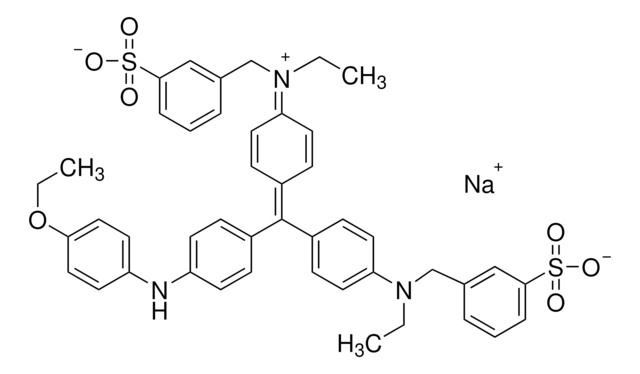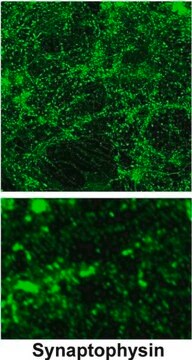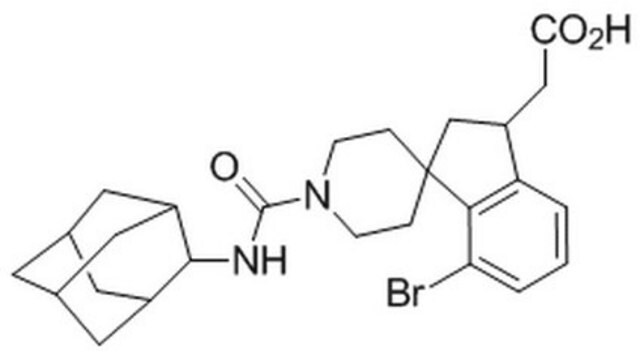V900307
CAPS
Vetec™, reagent grade, ≥98%
Synonym(s):
3-(Cyclohexylamino)-1-propanesulfonic acid
Sign Into View Organizational & Contract Pricing
All Photos(3)
About This Item
Linear Formula:
C6H11NH(CH2)3SO3H
CAS Number:
Molecular Weight:
221.32
Beilstein:
2835588
EC Number:
MDL number:
UNSPSC Code:
12161700
PubChem Substance ID:
Recommended Products
grade
reagent grade
product line
Vetec™
Assay
≥98%
form
powder
pH
3.0-7.0
pKa
10.4
mp
>300 °C (lit.)
solubility
water: 0.176 g/mL, clear, colorless
SMILES string
OS(=O)(=O)CCCNC1CCCCC1
InChI
1S/C9H19NO3S/c11-14(12,13)8-4-7-10-9-5-2-1-3-6-9/h9-10H,1-8H2,(H,11,12,13)
InChI key
PJWWRFATQTVXHA-UHFFFAOYSA-N
Looking for similar products? Visit Product Comparison Guide
Legal Information
Vetec is a trademark of Merck KGaA, Darmstadt, Germany
Storage Class Code
11 - Combustible Solids
WGK
WGK 1
Flash Point(F)
Not applicable
Flash Point(C)
Not applicable
Choose from one of the most recent versions:
Already Own This Product?
Find documentation for the products that you have recently purchased in the Document Library.
Tobias Reinhardt et al.
Molecules (Basel, Switzerland), 25(21) (2020-11-14)
Phosphonates are widely used as antiscalants for softening processes in drinking water treatment. To prevent eutrophication and accumulation in the sediment, it is desirable to remove them from the membrane concentrate before they are discharged into receiving water bodies. This
Frances E Lock et al.
Proceedings of the National Academy of Sciences of the United States of America, 111(34), E3534-E3543 (2014-08-13)
Remnants of ancient transposable elements (TEs) are abundant in mammalian genomes. These sequences harbor multiple regulatory motifs and hence are capable of influencing expression of host genes. In response to environmental changes, TEs are known to be released from epigenetic
Daniele de Sanctis et al.
The Journal of biological chemistry, 280(29), 27222-27229 (2005-05-27)
Hemoglobins at high concentration have been isolated long ago from some insect larvae living in hypoxic environments. Conversely, a monomeric hemoglobin has been discovered recently in the fruit fly Drosophila melanogaster as intracellular protein expressed both in larvae and in
Jelena Zaitseva et al.
Acta crystallographica. Section D, Biological crystallography, 60(Pt 6), 1076-1084 (2004-05-26)
Nucleotide-binding domains (NBDs), which are roughly 27 kDa in size, are conserved components of the large family of ABC (ATP-binding cassette) transporters, which includes importers and exporters. NBDs, or ABC-ATPases, supply energy for the translocation of a vast range of
Adrian Sculptoreanu et al.
Experimental neurology, 219(2), 562-573 (2009-07-28)
Neurokinins (NK) released from terminals of dorsal root ganglion (DRG) neurons may control firing of these neurons by an autofeedback mechanism. In this study we used patch clamp recording techniques to determine if NKs alter excitability of rat L4-S3 DRG
Our team of scientists has experience in all areas of research including Life Science, Material Science, Chemical Synthesis, Chromatography, Analytical and many others.
Contact Technical Service





